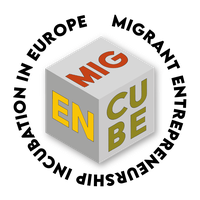MIG.EN.CUBE
RESEARCH PARTNERS
University of Bologna; Universiteit Van Amsterdam; Institut Supérieur de Gestion; Fondazione Grameen Italia; Impact Hub Amsterdam; Place Network; Impact Hub Company; Migration Policy Group
TEAM
Daniela Bolzani, Federica Bandini, Laura Toschi, Rosa Grimaldi, Giulia Martinelli

BACKGROUND AND GENERAL OBJECTIVE
There are more than 22 million non-EU immigrants in the European Union. Of these, about 2 million are self-employed. Entrepreneurship support for migrant entrepreneurs has become relevant to European policy-makers, as manifested by many initiatives launched to encourage migrants to start and grow their own businesses.
While these initiatives have increased the opportunities available to (aspiring) migrant entrepreneurs, less attention has been given to training initiatives towards the professionals responsible for providing incubation activities to them. Policy-makers and academic scholars have called for more attention to training initiatives for incubation professionals, particularly to help understand and manage the "super-diversity" of migrant entrepreneurs, i.e., their diverse legal, professional, educational, and social characteristics. Programs targeting migrants must consider their diverse needs in terms of business-related skills, soft skills, social networks, and cultural understanding.
MIG.EN.CUBE thus aims at:
- increasing the understanding of any specific incubation needs of migrant entrepreneurs and of the competences required for incubation professionals working with them;
- systematizing and sharing best practices for innovative incubation programs for migrants across Europe;
- providing incubation professionals with new, tried-and-tested materials and tools for advising, training, performing, and assessing incubation for migrant entrepreneurs.
WHAT WE DID
The methodology of the project is designed around four main phases:
-
the preparation phase, which provides the methodological and documentary background;
-
a mapping, research and evaluation phase, which aims to increase public understanding of the specific training needs of migrant entrepreneurs and incubation professionals dealing with this group;
-
the production phase, which concerns the development of training content targeted at incubation professionals;
-
the dissemination phase, aimed at ensuring the project's impact and sustainability.
Between January and April 2021, teams from each country mapped the migrant incubators present in Italy, France and the Netherlands, differentiating them according to the services they offer and the target group of entrepreneurs specifically served. The academic partners then conducted approximately 40 in-depth interviews with managers and contact persons from some of the identified migrant incubators. The interviews delved into information about the services offered, the types of entrepreneurs followed, the training needs expressed by the entrepreneurs. Part of the interview also delved into the background of the staff and the training they receive on the job. The research then continued with interviews with migrant entrepreneurs. A quantitative survey was then sent to the entire sample of incubators in July 2021. This survey contains a section with an experimental simulation (conjoint analysis) that has the double objective of studying the point of view of the managers of the incubators with reference to the incubation services required by different profiles of entrepreneurs; and to investigate the skills needed by the staff that directly follows these entrepreneurs. The results will allow the development of an ad hoc training course for incubation professionals, which will be tested and then released in the following phases of the project.
PUBLICATIONS
In September 2021, the first reports from the research phase of the project will be available and will be disseminated through a series of public events from October 2021.